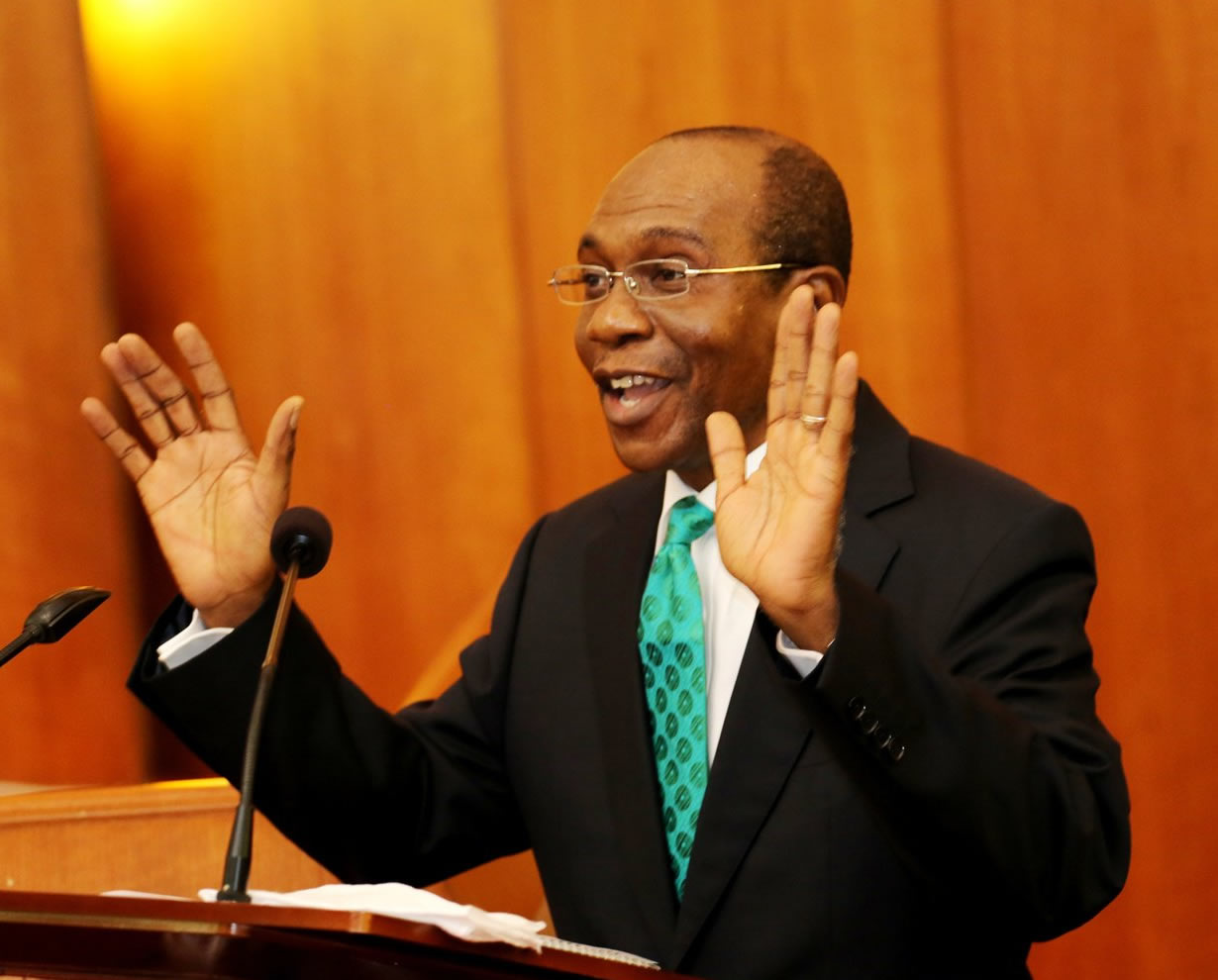Economy
13 Million African Children Malnourished – Emefiele

By Tony Obiechina, Abuja
The Governor of the Central Bank of Nigeria, (CBN), Mr Godwin Emefiele has warned of the dire consequences of continued food malnutrition presently ravaging millions of children in the African countries.
Emefiele who spoke at the opening of a seminar for African Finance Ministers and Central Bank Governors in Abuja on Monday said, “we must stop romanticizing food malnutrition in Africa, because it is evident that malnourished children today will lead to malnourished economies tomorrow”.
Represented by the CBN Director of Public Communications, Mr Isaac Okorafor, the governor pointed out that, “malnutrition is abnormal and affects millions of children in Africa. These children are either underweight or stunted, wasted or micronutrient deficient”.
The two-day seminar, with the theme, “Agriculture and Food Policies for Better Nutrition Outcomes in Africa”, was organized by the African Economic Consortium (AERC) in partnership with the CBN.
Alluding to a recent Global Report, Emefiele disclosed that “an estimated 57.9 million or 36% of children under the age of five in sub-Saharan Africa have abnormal physiological condition resulting from inadequate food intake or a recent bout with illness that may hinder appropriate intake and absorption of nutrients required for an active, healthy life”.
Accoding to him, this situation may constitute a threat to the lives of 13.1 million children in the region, adding that, the effects of which include, “vulnerability to illness, difficulty In school, and eventually reduced adult labour capacity”.
The governor said, “Binding constraints, such as limited access to technology, markets, infrastructure, finance, amongst others – also need to be addressed, as these challenges continue to limit agriculture across the continent and reduce its potential as a wealth- creating endeavour.
“Access to and secured ownership of land remain major challenges particularly for women and smallholder farmers in general because they lack eligible collateral.
“The absence of policies to encourage the use of movable collaterals, rather than fixed assets continues to constrain attempts to scale-up requisite financing to smallholder farmers in the region”.
He however stated that in Nigeria, the CBN has adopted some measures to redress the trend, by forging alliances with financial and non-financial institutions to improve smallholder farmers’ access to finance in furtherance of its developmental mandate.
“In recent years the Bank has set up two major vehicles – The Nigeria Incentives-based Risk Sharing for Agricultural Lending (NIRSAL) and the National Collateral Registry (NCR), and currently leverages both in the implementation of intervention programmes in the agricultural sector such as the Anchor Borrowers’ Programme (ABP), Agriculture Credit Guarantee Scheme (ACGS), Agribusiness Small and Medium Enterprises Investment Scheme (AGSMEIS).
“Across the country, these programmes have been implemented with resounding success – expanding credits with single digit interest rate to about 1.5 million smallholder farmers cultivating over 1.6 million hectares of various agricultural commodities.
“The programmes have also helped to reduce the nation’s food import bill from about US $3.40 billion as at 2014 to US $0.59 billion in 2018”, he added.
The governor also stressed the need for governments in Africa to urgently develop innovative policies to unlock the wealth in agriculture, which market size in terms of food and agribusiness, could be worth US $1 trillion by 2030 according to the African Development Bank (AfDB).
In his welcome address, Executive Director, AERC, Professor Njuguna Ndung’u noted there is a dearth of quality data to properly inform policies on nutrition and called for combine forces to achieve the best nutrition outcomes.
“Global Panel of Agriculture and Food Systems for Nutrition point out, there is a dearth of quality data to properly inform policies on nutrition. This has tended to limit the effectiveness of agricultural policies in improving nutrition outcomes”, he said.
Speaking on data challenges, Ndung’u said there has been lack of high-quality policy analyses that explore the effect of agricultural policies on nutrition.
He further said AERC’s mission is to strengthen local quality for conducting independent, rigorous into problems Pertinent to management of economies to enhance the capacity of locally based researchers to conduct policy relevant economic inquiry context.
“Our vision is to sustain development in Sub Saharan Africa grounded in sound economic management and an informed society”.
Top policy makers present at the opening ceremony included, Minister of Agriculture and Rural Development, Alhaji Sani Nanono; his Industry, Trade and Investment, counterpart, Otunba Adeniyi Adebayo and Executive Director of AERC, Prof Njuguna Ndungu as well as eminent paper presenters.
Economy
SEC Advocates Advanced Financial Inclusion by 2030

By Tony Obiechina, Abuja
The Securities and Exchange Commission (SEC) has stressed the need for Nigeria to harness its demographic dividend to advance financial inclusion through investments by 2030 for national survival or face deepening inequality.
The Director-General of the SEC, Dr Emomotimi Agama said this at the United Capital Asset Management Investment forum on Wednesday in Lagos.
Agama, in his keynote address titled: “Advancing Financial Inclusion through Investments: Bridging
Nigeria’s Knowledge and Wealth Gap,” said Nigeria must harness its demographic dividend to boost investment.
“Our theme, Advancing Financial Inclusion through Investments, is not aspirational; it is foundational to national survival.
“We stand at a pivotal moment. By 2030, Nigeria can either harness its demographic dividend or face deepening inequality. The knowledge-wealth gap is not merely an economic challenge; it is a moral imperative,” Agama said.
He said the term inclusion should be reframed as active financial involvement, where access meets empowerment, and capital becomes a tool for transformation.
Agama said that closing the financial inclusion gender gap could lift 700,000 Nigerians from poverty.
He said, “Nigeria has a great population yet we have a tiny drop of this number of persons involved in the capital market.
“That one reason for poverty, because we are running from money. We have to do something. Our market capitalisation is an opportunity to do something,
We all have
“We need to change the narrative and move the market forward. We must reach out to make the difference. We are committed to protecting investors and developing the market. Our goal is to do the right thing no matter whose ox is gored. We will work by the principles of fairness and equity to change the market. We will provide a fair ground for everyone to aspire.
He noted that MTN Nigeria’s share offering drew 150,000 new investors – 75 per cent women, 85 per cent under 40.
Agama recommended a four-pillar strategy for bridging the gaps.
He listed the four-pillar strategy as democratisation of financial knowledge, catalyse MSME Investment Channels, blended Finance Vehicles: Partner with Bank of Industry (BOI) to de-risk loans for women-led SMEs.
“We need to educate people about finances. As we drive this market, we do so for a purpose, I enjoin everyone to be the disciple and the apostles. Getting this market to move is a deliberate action,” he added.
| ReplyReply allForwardAdd reaction |
Economy
NPA Assures of Over N1.27trn Revenue in 2025

By Ubong Ukpong, Abuja
The Nigerian Ports Authority (NPA) on Monday assured that it would take into the coffers massive revenue of over N1.27 trillion in 2025, representing a 40 percent increase from the N894.86 billion it realized in 2024.
This ambitious target, the Authority said, was anchored on sweeping modernization efforts, the full activation of the Dangote Refinery’s marine operations, and the deployment of cutting-edge technology to enhance port efficiency.
Managing Director of the NPA, Abubakar Dantsoho, disclosed this in a presentation during his agency’s budget defence session wih the House of Representatives Committee on Ports and Harbours, where he defended the agency’s 2025 budget estimates and provided insights into its 2024 performance.
“Our 2025 budget proposal is more than figures, it reflects our aspirations for a more efficient, globally competitive port system,” Dantsoho told lawmakers, adding that over 70% of the proposed expenditure will go into capital projects.
For 2024, the Authority surpassed its revenue target of N865.39 billion, posting an actual realization of N894.86 billion.
However, Dantsoho revealed that only N417.86 billion, less than half of the approved N850.92 billion expenditure, had been spent as of the time of reporting.
Despite this, NPA made a record contribution of N400.8 billion to the Consolidated Revenue Fund (CRF) in 2024, nearly double the N213.23 billion remitted in 2023. Of this amount, a staggering N344.7 billion was deducted at source.
“This shows our unwavering commitment to national revenue generation, even when our own operational liquidity is affected,” the NPA boss stressed.
Dantsoho said the projected revenue increase is premised on several key assumptions and developments, including: The full operation of the Dangote Refinery, which alone is expected to draw in over 600 vessels annually through its Single Point Mooring (SPM) system; the commissioning of upgraded terminals at WACT and OMT, which will enhance container traffic; the implementation of automation tools such as the National Single Window, Port Community System (PCS), and Vessel Traffic Management System (VTMS); and increased cargo volumes stemming from global disruptions, including the Russia-Ukraine conflict, which has affected global trade routes.
He said the 2025 revenue is expected to come from the following key sources: Ship Dues, N544.06 billion; Cargo Dues, N413.06 billion; Concession Fees, N249.69 billion; and Administrative Revenue, N73.07 billion
Of the proposed N1.14 trillion total expenditure for 2025, N778.46 billion is earmarked for capital projects.
This investment, he said, will target the revitalization of critical infrastructure, including the Calabar, Warri, and Burutu ports and channels, and enhance towage services, channel depth, and compliance with international security conventions.
“Investments in infrastructure and technology are non-negotiable if we are to stay competitive regionally and globally,” Dantsoho emphasized.
He cited increasing competition from neighboring ports and aging assets across Nigeria’s coastal corridors.
The NPA also intends to address technology gaps by upgrading legacy systems and bolstering cybersecurity, ensuring Nigerian ports meet global standards for digital operations.
“We can say that with timely access to internally generated revenue and capital funds NPA would deliver the kind of impact Nigeria expects,” he said.
Chairman of the Committee, Hon. Nnolim Nnaji, urged the NPA to ramp up performance, improve port infrastructure, and play a greater role in addressing Nigeria’s revenue and unemployment challenges.
Nnaji said the ports remain a critical pillar of Nigeria’s economy, and urged the agency to meet rising expectations despite operational challenges.
“No country can thrive economically without high-performing ports. They are the economic heartbeat of every nation, determining how buoyant a country is through the flow of imports and exports,” Hon Nnaji said.
The committee praised NPA for its performance.
Nnaji stressed that the NPA’s performance has implications beyond maritime activity, noting that increased port output can significantly boost job creation across several sectors.
“The Nigerian Ports Authority is not just a revenue-generating agency, it is a national asset in terms of employment and economic impact.
“We expect to see detailed strategies on how to improve revenue generation and expand employment opportunities through your 2025 budget,” he said.
The lawmaker also pointed to growing interest in the development of new ports across the country but cautioned against neglecting existing port infrastructure.
“As we welcome investment in new ports, we must not abandon the old ones. Maintaining and upgrading our existing ports, both in the Eastern Corridor and the Western axis, is essential to long-term sustainability,” he added.
The Committee called for a clear outline from the NPA on how its 2025 financial plan will address pressing national concerns and reaffirm Nigeria’s competitiveness in regional and global maritime trade.
Economy
Senate Sets N10trn Revenue Target for NCS, Urges Agency to Curb Smuggling, Illicit Drugs

By Eze Okechukwu, Abuja
The Senate, through its Committee on Customs has set a revenue target of N10 trillion for the Nigeria Customs Service for the 2025 fiscal year, instead of the initial N6.584 trillion given to her earlier on while urging the agency to clamp down on smuggling and Illicit drugs.
The Chairman of the Committee, Senator Isah Jibrin (Kogi East), who gave the agency the marching order yesterday in Abuja during the budget defence of the revenue driving agency however commended her for exceeding its 2024 revenue target of N5.
079 trillion.The NCS team led by Deputy Comptroller General, Jibo Bello who represented the Comptroller General presented the 2024 budget performance with a revenue target of N5.
079 trillion, stressing that the proposal was exceeded by over a trillion naira.The Committee, obviously impressed by the performance commended NCS before asking them to go ahead and present the 2025 budget proposal, which the agency tied at N6.584 trillion revenue target with an expenditure of N1.132 trillion.
Following their presentation, members of the Senate Committee on Customs unanimously approved the recommendation of the revenue target of N6.584 trillion and the expenditure of N1.132 trillion for the 2025 financial year.
The Committee will subsequently present the budget proposal to the Senate at plenary most likely this week as the red chamber resumes today after a long recess tied to Eid celebration.
In his final remarks, Senator Jibrin emphasised the need for the NCS to rise up in terms of its surveillance with respect to illicit drugs and smuggling “to ensure that, as much as possible, you should be on top of your game”.
He said there are so many illicit drugs flowing all over the place, which according to him “is contributing to the issue of banditry in Nigeria because most of these guys are on drugs. What I’m saying is that, in addition to your revenue drives, you should also be mindful of some of these other functions.
























